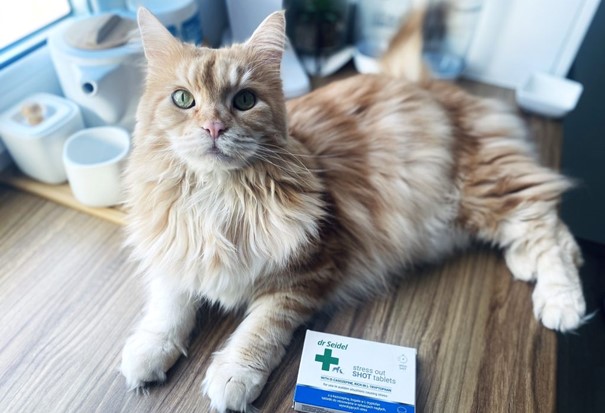What is alpha-casozepine and how is it used in animal behavioral therapies?
What is alpha-casozepine and how is it used in animal behavioral therapies?
It is said that folk wisdom is reflected in sayings and proverbs. Cow’s milk has long been considered a drink with natural “calming” properties. Studies have shown that some peptides present in milk can have a calming effect (Brezinova and Oswald, 1972).

Table of contents
What is alpha-casozepine?
Alpha-casozepine is a natural peptide obtained from cow’s milk, the mechanism of action of which has been identified in newborns fed with mother’s milk. It has a calming effect, reduces tension and facilitates sleep. It is a safe and easily available preparation. Studies have shown that oral administration of alpha-casozepine is effective in the treatment of anxiety disorders in pets, alleviates emotional disturbances and reduces avoidance behavior and stress levels in animals suffering from generalized anxiety disorder.
The first stages of animal behavioral therapy often include activities aimed at reducing emotional tension and lowering stress levels. For this purpose, behaviorists sometimes offer support in selecting auxiliary techniques, such as dietary supplements. Alpha-casozepine supplementation may facilitate the conduct of a behavioral modification program because, thanks to its anti-anxiety effect, it not only reduces stress, but also raises the reaction threshold, which in turn reduces the animal’s reactivity to stimuli.

How does alpha-casozepine work in dogs and cats?
Alpha-casozepine helps regulate mood, which is an extremely important element in behavior therapy. Mood has a significant impact on subjectively experienced emotions, perception and cognitive abilities, as well as behavioral responses. It directly influences how the environment is perceived (this is called cognitive attitude) and how individual stimuli are perceived – what emotions they evoke. By introducing individual stages of behavior therapy without correcting the mood, we fall into a vicious circle because the animal may perceive many things negatively, which will worsen its mood and the therapy will not be effective. If he was in a good mood, he would perceive individual elements differently and they would be more likely to be effective. Therefore, for the therapy to bring the expected results, it is first necessary to stabilize the mood, in which support in the form of alpha-casozepine supplementation can be very helpful. It does not directly affect the level of neurotransmitters responsible for mood and well-being, but by lowering the level of stress hormones, it secondarily regulates their level.

Effects of stress in dogs and cats
Additionally, taking steps to minimize stress is more important than once thought. Regular exposure to stressful situations leads to chronic stress, which has a devastating effect on the body. Chronic stress causes, among other things, deterioration of the immune system, inhibition of learning processes, and hypersensitivity of the nervous system, which in turn translates into a lower reaction threshold and reduced control over emotions. As a result, we may experience a greater tendency to act impulsively and even aggressively. In times of severe stress, the part of the nervous system responsible primarily for emotional reactions takes control of the animal’s reactions, leaving no room for rational thinking. Therefore, in difficult situations, the animal may have trouble controlling its arousal and react in a way that is difficult to control.
How to support dogs and cats in emergency situations that cause stress?
Emergency supplementation with alpha-casozepine is perfect for emergency or highly stressful situations, such as:
- disease,
- a visit to the veterinary office, to the groomer
- trip,
- move,
- time around New Year’s Eve,
- the arrival of a new household member,
- medical procedures, e.g. drips,
- storm
It is worth then, in close cooperation with a veterinarian, to use auxiliary techniques that will help relieve stress and increase the pet’s comfort. By making this effort, we reduce the chance of developing behavioral disorders or undesirable behaviors.
Sonia Muller
Behawiorysta psów i kotów
1 December 2023


